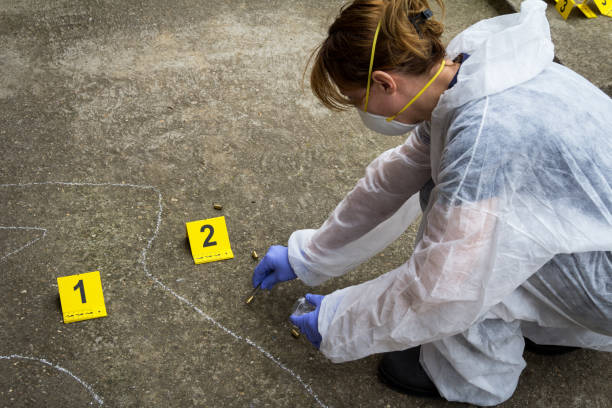The Top Forensic Degree Jobs

Forensic science is a field that can be extremely interesting and rewarding. The demand for forensic professionals is expected to grow by 13% through the year 2020, meaning that there will be plenty of job opportunities in this growth area. In this article, we’ve listed 10 of the top Forensic career jobs and what they entail so you can see if this is the right career path for you!
What are the Top Forensic Degree Jobs?
Forensic science is a growing field, with many different jobs available for those with the right degree. Here are the top 10 forensic degree jobs:
Blood Pattern Analysis
Blood pattern analysis is a critical skill for forensic investigators. This is because blood spatters can provide important evidence in a criminal investigation.
Blood pattern analysis is the process of analyzing the distribution, shape, and size of blood spatters on surfaces. This information can help to determine how the victim was injured and where the weapon used in the assault was located.
Blood pattern analysis is also used to identify suspects and track their movements. By understanding how blood was spattered, forensic investigators can piece together a timeline of events leading up to the crime.
There are quite a varying number of degrees that qualify someone for careers in forensic pathology. Some of the most common degrees include law enforcement, medical science, and biology. However, anyone with an interest in Forensics can pursue a career in this field.
Forensic Engineering
Forensic engineering is a specialty in engineering that focuses on the analysis and interpretation of evidence. There are many forensic engineering jobs available, but the most common ones are forensic scientists, forensic engineers, and crime scene investigators. Forensic scientists work in laboratories or at crime scenes to collect evidence.
They use scientific methods to analyze the evidence and extract information that can be used to solve crimes. Forensic engineers work on projects that involve the analysis of evidence. They may design or build instruments or equipment that are used in investigations. They may also help to create models or simulations to help investigators understand how events unfolded.
Digital forensic analysts work with computers and other electronic devices to determine how they were used and what information was accessed. They use a variety of techniques to recover data from damaged or deleted files.
Other popular forensic degree jobs include computer crime investigator and digital forensics examiner. Computer crime investigators help companies protect their computers from attack. They also investigate computer crimes, such as hacking, theft of data, and fraud. Digital forensics examiners work with computers to identify evidence of a crime. This can include locating deleted files, tracking online activity, and analyzing computer software.
Crime Scene Investigation
Crime scene investigation (CSI) is a field of forensic science that involves the examination of traces of crime left at the scene. This can include analyzing physical evidence such as fingerprints, DNA, and gunshot residue, as well as interviewing witnesses and reviewing video footage.
CSI is a highly sought-after field because it offers great opportunities for career growth. Jobs in CSI tend to be in high demand, and there are always openings for qualified candidates. Many forensic scientists who work in CSI go on to become directors or senior investigators.
There are many different types of CSI jobs, including:
• Crime scene investigator: A crime scene investigator is responsible for investigating crime scenes and gathering evidence. They may collect physical evidence, interview witnesses, and review video footage.
• Fingerprint examiner: A fingerprint examiner examines fingerprints found at a crime scene to determine whether they belong to anyone in the database.
• Ballistics specialist: A ballistics specialist conducts tests on bullets and firearms to help identify the shooter or shooters. They may also reconstruct firearms accidents.
• Forensic pathologist: A forensic pathologist refers to a medical doctor who specializes in investigating deaths that involve violence or trauma. They may work with law enforcement
Cybersecurity
One of the most important forensic degree jobs is cybersecurity. This field involves protecting computer systems from attack and protecting the data that is stored on those systems.
A forensic scientist who is skilled in cybersecurity will work with law enforcement agencies to investigate cybercrime. They will also work with companies to protect their computers from attack.
Cybersecurity is an ever-growing field, and there are several different positions available for people who want to join the field. There are a variety of degrees that you can obtain to become a forensic scientist who specializes in cybersecurity. You can go to college and major in forensic science, or you can take a course in cybersecurity and then seek a degree in that area. Whichever route you choose, make sure you select a school that offers excellent cyber security programs.
Cybercrime and Information Security
One of the fastest-growing in the field of Forensics is cybercrime and information security. Cybercrime refers to crimes committed using computers, while information security deals with protecting data from being accessed or stolen by unauthorized individuals.
There are a number of forensic degree jobs available in this field. These jobs include working as a forensic investigator, cybercrime analyst, computer crime specialist, digital forensics examiner, and information security officer. Forensic investigators work to identify the cause of a crime, while cybercrime analysts work to identify and prevent cyberattacks. Computer crime specialists investigate computer hacking cases, while digital forensics examiners examine digital evidence to help solve crimes.
Information security officers work to protect company data and systems from being compromised. They also work to create policies and procedures to protect company information from being stolen. This is a rapidly growing field, and there are many opportunities for people with a forensic degree to get involved.
DNA Analysis and Identification
One of the top forensic degree jobs is DNA analysis and identification. This job requires a lot of skill in working with DNA evidence. People who work as DNA analysts usually have a degree in forensic science. They also need to have good analytical skills, as well as knowledge of criminal law.
DNA analysis is used in a variety of legal cases. These cases can include investigations into crimes such as murder, rape, and child abuse. DNA analysis is also used to identify individuals who have been injured in accidents or who have died.
DNA analysis is a very important job, and there are currently a lot of people looking for jobs in this field. If you want to be a successful DNA analyst, you need to have both the training and the skills required for the job.
Fingerprinting and Photographic Evidence Analysis
One of the top forensic degrees that you can pursue is fingerprinting and photographic evidence analysis. This is a field that deals with the examination of physical evidence, such as fingerprints and photographs, to figure out who did what to what.
A fingerprint examiner is responsible for examining fingerprints to see if they belong to anyone in particular. They may also be called upon to compare fingerprints against those in databases to see if they match up.
A photographic evidence analyst person is responsible for examining photographs and other images to figure out what happened at the scene. They may also be involved in the investigation of crimes that involve photography or video footage.
Given the growing importance of forensic science, it is important to have a degree in this area if you want to pursue a career in this field. There are many opportunities available for people with a forensic degree, and the field is constantly growing in importance.
Fun Facts about Forensic Pathology
- Forensic pathology is one of the most fascinating and rewarding careers out there. It combines the art of solving crime with the science of medicine to provide crucial information that helps law enforcement officials solve cases.
- Forensic pathology is a rapidly growing field, due in part to advances in technology and the growth of forensic science as a whole. Jobs in forensic pathology are always in demand, thanks to the increasing use of forensic technology in investigations.
- If you want a career in forensic pathology, you’ll need to have a strong background in biology, chemistry, and physics. You’ll also need to have an understanding of criminal law and how it intersects with medical science. Finally, you’ll need strong analytical skills and the ability to work independently.
You might also find these articles interesting:
- The Best Jobs For A Criminology Degree
- Top Careers in Sociology
- What Is A Marketing Job, And What Are The Types Of Jobs In…
- The Highest Paying Jobs For Math Majors
- Top 5 Highest Paying Jobs On Campus
- Highest Paying Computer Science Jobs
Frequently Asked Questions:
Is Forensics a good career?
Yes, it as it offers a large number of lucrative jobs.
Is Forensics science hard to study?
Yes, Forensic science is hard to study. You need to have strong problem-solving skills, writing skills, and thinking.
Conclusion
In this article, we have compiled the top forensic degree jobs that are in high demand right now. If you desire a career in Forensics, then you should definitely consider one of the above positions!
By reading this article and researching each position, you will be well on your way to finding the perfect career for you. Be sure to keep an eye out for future articles like this that will provide even more information on specific forensic degrees and their corresponding careers. For more high paying jobs, visit Dailygam.com.






